'We feel we've lost our kids to smartphones'
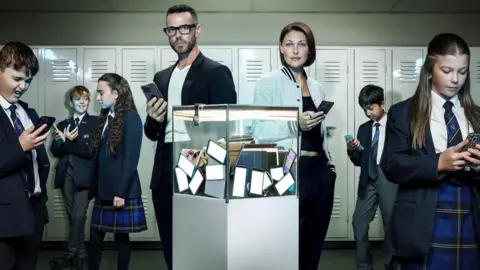 Channel 4
Channel 4TV personalities Matt and Emma Willis said they wanted to be a part of a new documentary because they felt they had "lost their kids" to smartphones.
The two-part series is a social experiment tackling the impact of smartphones and social media on children. The first episode was broadcast on Wednesday.
Pupils at The Stanway School in Colchester underwent a series of tests with experts monitoring their behavioural changes as they give up their phones for 21 days.
"When we sat down with the parents at the school, our feelings were resonating back at us," said Emma Willis.
"So many parents feel like they're losing their kids to their devices. We sit at home and say that we feel we've lost them."
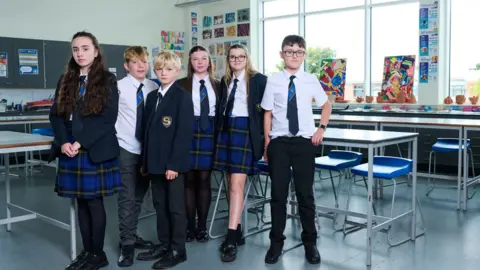 Channel 4
Channel 4Emma Willis, who lives with her husband in Hertfordshire, told the BBC: "We wanted to get involved because we're living it at home.
"We are worried about the impact that smartphones are having on our kids."
The couple have three children, 15, 12 and eight years old - similar ages to that of the Year 8 pupils in the programme.
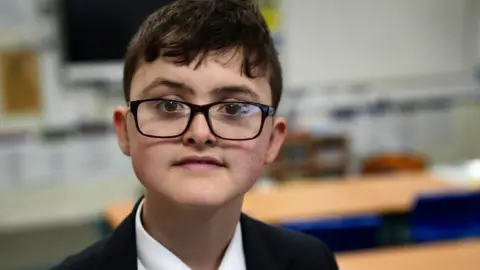 John Fairhall/BBC
John Fairhall/BBCHarry, a pupil who took part in the experiment, said that he used his phone for "at least nine hours a day" before filming the documentary, "looking at YouTube, gaming and texting".
He described the moment he had to give up his phone: "It was dreadful.
"It's like a part of me is missing and something that I need in my life is now in a box for three weeks."
But by the end of the 21-day experiment he said he was "more interactive" and it had made him realise "I've got to be careful what I'm looking at [online]".
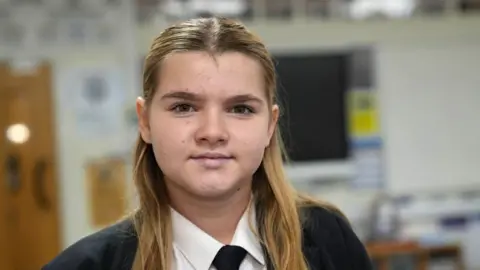 John Fairhall/BBC
John Fairhall/BBCScarlett said she enjoyed taking part in the programme. Throughout the experiment she did not experience "panic attacks or anxiety", which she thought was a direct result of the smartphone ban.
"I don't think it helped scrolling TikTok and not talking about how I felt," she said.
"When I had no phone I was completely fine - I concentrated in lessons, I understood, I was more sociable, I was kind to people, I came downstairs and helped my family... we were playing board games every night."
She now believes "smartphones should be banned for children under 16".
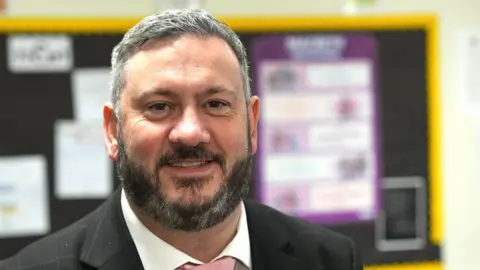 John Fairhall/BBC
John Fairhall/BBCJohn Player, the head teacher at The Stanway School, said staff noticed a considerable difference in the students after the experiment.
"There was a 17% drop in anxiety symptoms in students. The impact was really quick," he said.
"They slept on average an extra hour a day, which is going to have a huge impact on mental health.
"There was an 18% reduction in symptoms relating to depression and a 3% improvement in working memory in just 21 days."
A recent Education Select Committee report revealed that one in four children now used their phones in a manner resembling behavioural addiction.
The school plans to run courses for parents after Christmas to help them understand how the phone and their algorithms work.
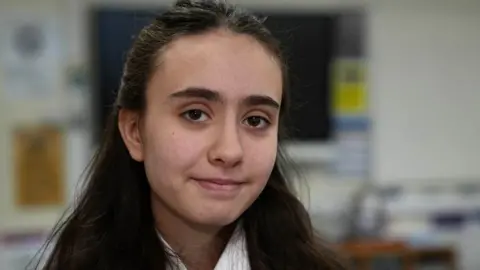 John Fairhall/BBC
John Fairhall/BBCJessica had not believed she was addicted to her phone before she took part.
"But actually I think everyone who has a phone is probably addicted, especially as it's such a big part of daily life, so hard to get rid of it," she said.
"At first I was really, really excited and felt like it'd be a weight off my shoulders - in the early days I kept reaching for it."
She did miss talking to friends online, but soon realised she did not miss apps like TikTok and Instagram, and she was "definitely talking to my mum more and being more focused".
She did point out: "Even our homework is all set online and nothing is written out on paper... maybe we should have our homework on paper?"
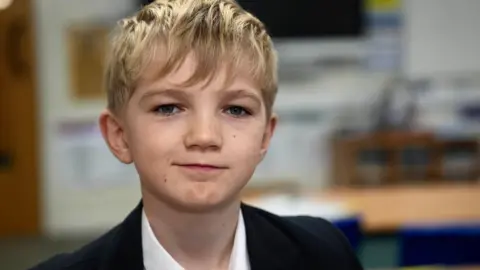 John Fairhall/BBC
John Fairhall/BBCMiles initially wondered what he would do when he got home from school.
"I was used to coming home and just chilling whereas without it I had to come home and do stuff," he said.
He said he was now more sociable with his family and before the experiment he had no idea what a smartphone "can do to your mental health and your personality".
Now, "I try to put it down when I'm playing my game.. and realise I've been on it too long and I just go downstairs and have another cup of tea".
Follow Essex news on BBC Sounds, Facebook, Instagram and X.
